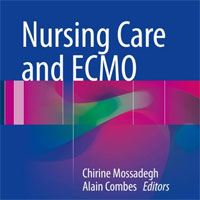Tag: research

Intra-Operative Events During Cardiac Surgery are Risk Factors for the Development of Delirium in the ICU
Risk factors for delirium following cardiac surgery are incompletely understood. The aim of this study was to investigate whether intra-operative pathophysiological alterations and therapeutic interventions influence... read more

Improving Outcomes for ICU Survivors
In response to the many challenges faced by ICU survivors today, there has been an increasing need to relieve this burden. Despite that many clinical trials have been implemented to find new strategies, post-intensive care... read more

Collaborative Practice in Critical Care Settings
This practical and evidence-based workbook offers a series of assessment, implementation and evaluation activities for professionals working in critical care contexts. Designed to improve the quality of care delivery,... read more

Occupational Therapy in the ICU
The role of occupational therapists in ICU rehabilitation is not currently well established. Current interventions in the ICU are dominated by physical rehabilitation with a growing role in communication and delirium... read more

Traditional vs. Alternative Metrics to Measure the Impact on Critical Care Medicine
In this analysis of major pulmonary and critical care journals the correlation between traditional publishing metrics and Altmetric Attention Scores (AAS) was fair, with a strong positive correlation between citations and... read more

Critically Ill Patients Show a Differential Contractile Response to Neuromuscular Electrical Stimulation
This retrospective sub-analysis aimed to outline the characteristics of, as well as predictors for, a contractile response to Neuromuscular Electrical Stimulation (NMES), and also potential clinical benefits resulting from... read more
Vitamin D Deficiency in ICU Patients
Vitamin D research has experienced a true hype in all fields of medicine in the last decades. In critical illness, this increased interest has only started 10 years ago. The high prevalence of vitamin D deficiency in... read more

Antipsychotics Not Helpful for Delirium in ICU
Delirium is a confused mental state that includes changes in awareness, thinking, judgment, sleeping patterns, and behavior. It can affect patients of any age but is more common among older adults who experience major illness... read more

Procalcitonin-Guided Use of Antibiotics for Lower Respiratory Tract Infection
The provision of procalcitonin assay results, along with instructions on their interpretation, to emergency department and hospital-based clinicians did not result in less use of antibiotics than did usual care among patients... read more

Determinants of Citation Impact in Large Clinical Trials in Critical Care
Clinical trials conducted by investigator-led research groups are significantly more frequently cited than industry-led trials in critical care medicine. In addition, costs appear to be substantially lower with investigator-led... read more

Comparison of Diagnostic Accuracy Among Procalcitonin, C-reactive protein, and Interleukin 6 for Blood Culture Positivity in General ICU Patients
Despite various technological advances, it still usually takes at least 24 to 48 h to obtain a blood culture result. The subsequent delays in diagnosis and treatment of infection can negatively impact care in the intensive... read more

More Precise Sepsis Therapy with Distinct Clinical Phenotypes
In this retrospective analysis of data sets from patients with sepsis, 4 clinical phenotypes were identified that correlated with host-response patterns and clinical outcomes, and simulations suggested these phenotypes may... read more

Laryngeal Injury and Upper Airway Symptoms After Oral Endotracheal Intubation With Mechanical Ventilation During Critical Care
Laryngeal injury from intubation is common in the ICU setting. Guidelines for laryngeal assessment and postextubation surveillance do not exist. A systematic approach to more robust investigations could increase knowledge... read more

Department-Based ICU Improves Patient Survival Rates
A new Michigan Medicine study found that implementing a dedicated emergency medicine department-based intensive care unit improved patient survival rates and lowered inpatient intensive care unit (ICU) admissions. In the... read more








